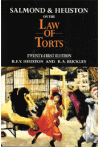- Author(s): R.F.V. Heuston, Prof. Richard A. Buckley
- Publisher: Sweet & Maxwell
- Edition: 21 Indian Rp Ed 2022
- ISBN 13 9789391155605
- Approx. Pages 594 + Contents
- Format Paperback
- Approx. Product Size 24 x 16 cms
- Delivery Time 3-5 working days (within Kerala & South India) (Others 7-9 days)
- Shipping Charge Extra (see Shopping Cart)
............................................................................................
Description
Although Robert Heuston did not live to see this twenty-first edition through to its final stages, he was able to continue working on the text during the final months of his life and left behind drafts of chapters 1-4, 6-8 and 14-20. I have endeavoured to incorporate subsequent changes and developments in those chapters at the proof stage, and have been solely responsible for all the remaining chapters. Two important legislative developments were taking place as the finishing touches were being put to this edition. I was fortunately able to deal in the text with the main provisions of the Defamation and Damages ills, as they then were, before the book went to press. The former includes, inter alia, a new procedure for the summary disposal of defamation claims while the latter improves the damages regime relating to personal injury and fatal accident cases. Since both bills subsequently received the Royal Assent references to them, mainly in Chapters 8 and 24, should be amended accordingly. Our highest domestic tribunal provided something of a feast for tort lawyers during the period covered by this edition: the House of Lords had on several occasions to examine fundamental aspects of the subject, and more than once found itself to be sharply divided. Although some may regard decisions reached without unanimity as a regrettable source of uncertainty, to this writer at least they provide evidence both of the law's continuing vitality and of the issues in question having been properly thought through. Bland compromise committee-style judgments, whatever their perceived advantages in other systems, have rarely been conducive to the development and clarity of the common law. The decision by a majority of the House in Spring v. Guardian Assurance, enabling victims of negligent but non-malicious misstatements to recover damages from defendants who would formerly have been protected by qualified privilege in the law of defamation, is of obvious practical importance. In White v. Jones the House settled a long-standing controversy by confirming, by a bare majority, that the 1979 decision of Sir Robert Megarry V-C in Ross v. Caunters had been correct. In Page v. Smith and Marc Rich v. Bishop Rock Marine Co. the House was divided on the role of foreseeability in psychiatric injury and physical damage cases respectively.
............................................................................................
Table of Contents
Chapter 1 : Introduction
Chapter 2 : General Principles of Liability
Chapter 3 : New and Emergent Torts
Chapter 4 : Trespass to land
Chapter 5 : Nuisance
Chapter 6 : Interests in Goods
Chapter 7 : Trespass to the Person
Chapter 8 : Defemation
Chapter 9 : Negligence
Chapter 10 : Statutory Duties
Chapter 11 : Dangerous Premises
Chapter 12 : Defective Products
Chapter 13 : The Rule in Rylands vs Fletcher and Liability for Fire
Chapter 14 : Liability for Animals
Chapter 15 : Domestic Relations
Chapter 16 : The Economic Torts
Chapter 17 : Trade Disputes
Chapter 18 : Deceit and Injurious Falsehood
Chapter 19 : Wrongful Process of Law
Chapter 20 : Parties
Chapter 21 : Vicarious Liability
Chapter 22 : Miscellaneous Defences
Chapter 23 : Damages: General Principles
Chapter 24 : Damages for Personal Injury and Death
Chapter 25 : Remedies: Miscellaneous Matter
Chapter 26 : Extrajudicial Remedies
............................................................................................
Author Details
The Late R. F. V. HEUSTON, D.C.L., F.B.A. Honorary Fellow of Pembroke College, Oxford
Honorary Bencher of Gray's Inn, and of the King's Inns, Dublin
R. A. BUCKLEY, M.A., D.PHIL. Professor of Law, University of Reading Of Lincoln's Inn, Barrister

